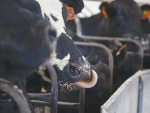Reports from teams around the country show the season has been pretty good, but “a bit stop-start” with temperature fluctuations. “We got off pretty well but then it got a bit cold. There’s been quite variable pasture growth so it makes it difficult for farmers to manage pasture with precision when things can change dramatically from 80kg/ha one day then pull back sharply and then race away again.
“So that’s been the story of the season in the consistent feedback I’ve had from throughout the country.”
As temperatures fluctuate “you go from thinking you are a bit short of grass, then you have bit of surplus because it warms up and roars away. You shut up some silage then find the grass and silage have slowed down because it has cooled off again”.
However aside from the floods in Northland in July there have not been too many significant weather events.
“But the variability of temperatures has made it challenging for farmers to make decisions about what grass they will have in a couple of weeks, therefore what grazing decisions they should be making today.
“There’s no substitute for attention to detail and having a good look at what is happening on a regular basis because as it changes you need to adjust your management decisions a bit.
“If you’ve got plenty of grass that’s the cheapest feed in what’s obviously a low payout year. Having high utilisation of seeds you’ve already paid for and grown is one great way of optimising your profitability.
“Keeping a close eye on your pasture condition… and maintaining the quality of that grass as a priority is always good advice. Then filling the gaps in the cows’ nutritional or energy needs with supplement comes after that.”
In the challenging times, looking more often at grass will give farmers better returns, McBeth says.
On the economic side of things farmers must be prepared to do their sums, he says. The latest GDT showed prices had not yet turned a corner. Farmers must understand the financial state of their business, and talk to people who support them such as their bank and tax planners. “Assessing what they need to be spending this year and what they can avoid spending money on is what farmers will be focussing on.”
Farmers under extra pressures, e.g. floods in Northland or cows dying in Southland, have been through economically damaging and emotionally stressful events. Rural Support Trust and DairyNZ have been working hard in those areas.
Farmers under pressure this year need to come up with a plan, share the plan and talk to their bank and other rural professionals.
“Work through your options, communicate to the people who matter, is the best advice.”


















